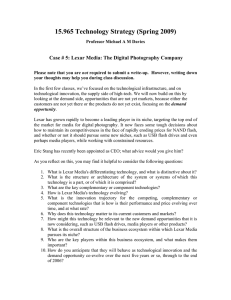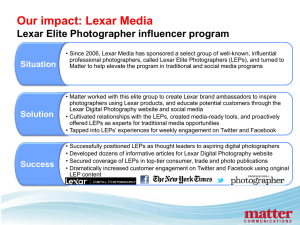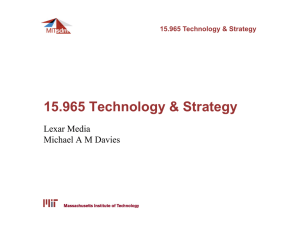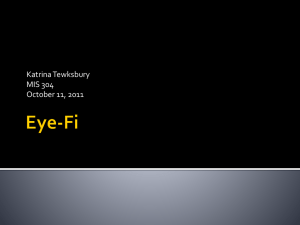Lexar Media Inc.
advertisement
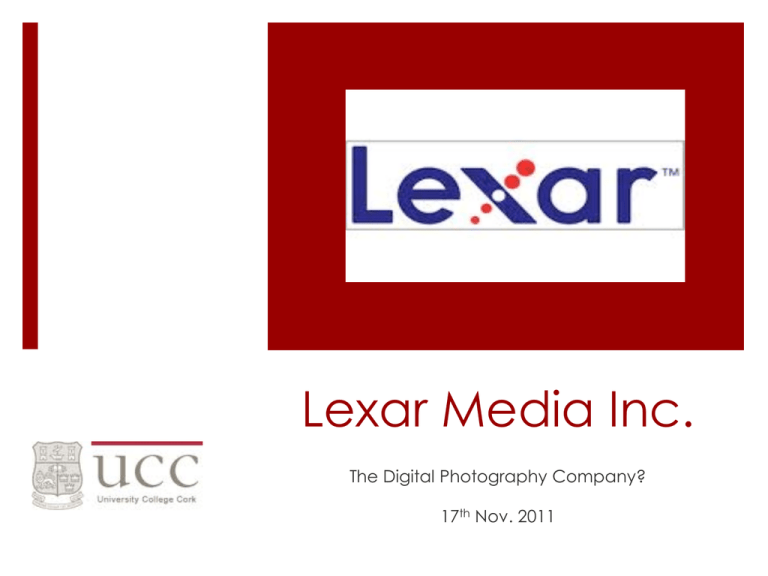
Lexar Media Inc. The Digital Photography Company? 17th Nov. 2011 Lexar Media Monica Fan Denise Ahern Victoria Sheehan Sean O’ Leary Eimear Clancy Lexar Media : General Overview John Reimer –President and CEO 1997 In 2001 branched in USB marketplace Takeover in 2006- Micron Market Flash Card Market Sales Volume (billion) 6 5.282 5 4 Sales Volume (billion) 3 2 1 1.254 0.221 0 1997 2000 2004 Market Particular for Digital Photography Market Sales Volume (million) 40 35 30 25 20 15 10 5 0 38.7 11.6 1999 Sales Volume (million) 15.1 2000 2005 Strategies Luring Market: Digital Photography Focus Distribution Strategies Original Being direct to Retailers Equipment “Push” Strategy Manufacturer Relationships Crossing the Chasm Three Segments in the Market Professionals Prosumers Amateurs Crossing the Chasm Average Camera Users 3C Campaign Lexar-using Elite Photographers A free data recovery service to customers Professionals Reputation John Reimer CEO and President 1997- 2004 • Passionate about Photography • Former VP of SanDisk, Lexar’s Main competitor • Visionary How Reimer successfully established the Lexar brand • Company focused solely on one market, digital photography • Aimed it at the right market, professional photographers Why were Lexar Media so successful? Distribution Strategy: Two-tied strategy: sell to both camera manufacturers and directly to retailers Partnerships: Strategic partnerships with Sony, Samsung and Olympus Product: Proprietary technology made the digital film up to three times faster than their competitors SWOT Analysis o Strengths: Differentiated product and market strategy Strategic relationships Cards certified for “Digital Film Compliance” o Weaknesses: Too focused on photography Purchase flash memory from external providers SWOT Analysis Opportunities: Memory used via USB port Create new relationships with other camera brands Threats: SanDisk is their major competitor Relationship with Sony could break down Lexar: Developments Since 2001 2001: After missing Quarterly numbers, Printroom.com is sold to it’s original founders. Shoot & Share and SayCheese.com are discontinued. 2002: Lexar signals it’s diversification as a company by removing the words “digital film” from its packaging. Lexar: Developments Since 2001 Lexar announces and ships it’s first USB Flash Drive. 2003: Lexar enters the MP3 market with it’s JumpDrive Music player. Lexar: Developments Since 2001 2004: Lexar agreed a deal with Kodak that allows it to distribute flash cards branded with Kodak’s name. Lexar also entered the gaming storage market. Although revenues continued to grow strongly from 2003 – 2005, Lexar was still unprofitable and losses were increasing. SanDisk, cash rich and profitable, was able to slaughter the competition as regards pricing. Lexar was at a crossroads and needed a new strategy. Lexar: Developments Since 2001 2006: Micron, one of the world’s leading semiconductor companies, acquired Lexar for $850M. As Micron developed it’s own NAND, the biggest cost for card makers, Lexar was able to avail of significant savings. Lexar had previously sourced flash memory from Samsung. Now Subsidiary of Micron Technology, Inc Digital photo/video Gaming Personal Storage Mobile storage Any Questions?
